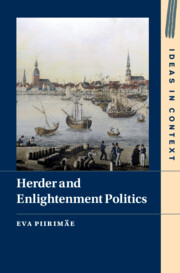Book contents
- Herder and Enlightenment Politics
- Ideas in Context
- Herder and Enlightenment Politics
- Copyright page
- Contents
- Preface
- Acknowledgements
- Note on Translations
- Abbreviations
- Introduction
- Chapter 1 Republics, Monarchies and the Philosophy of Human Society
- Chapter 2 Rousseau and the Origins of the ‘Current Malaise of the World’
- Chapter 3 Montesquieu’s System and Reforms in Russia
- Chapter 4 The Bildung of Humanity and Modern Virtue
- Chapter 5 German Freedom and Modern Liberty
- Chapter 6 The Vocation of Poets, Pastors and Philosophers
- Chapter 7 State-Machines, Commerce and the Progress of Humanität in Europe
- Chapter 8 Perpetual Peace and Purified Patriotism
- Conclusion
- Epilogue
- Bibliography
- Index
Epilogue
Published online by Cambridge University Press: 30 March 2023
- Herder and Enlightenment Politics
- Ideas in Context
- Herder and Enlightenment Politics
- Copyright page
- Contents
- Preface
- Acknowledgements
- Note on Translations
- Abbreviations
- Introduction
- Chapter 1 Republics, Monarchies and the Philosophy of Human Society
- Chapter 2 Rousseau and the Origins of the ‘Current Malaise of the World’
- Chapter 3 Montesquieu’s System and Reforms in Russia
- Chapter 4 The Bildung of Humanity and Modern Virtue
- Chapter 5 German Freedom and Modern Liberty
- Chapter 6 The Vocation of Poets, Pastors and Philosophers
- Chapter 7 State-Machines, Commerce and the Progress of Humanität in Europe
- Chapter 8 Perpetual Peace and Purified Patriotism
- Conclusion
- Epilogue
- Bibliography
- Index
Summary
It is important to differentiate between various kinds of appropriations of Herder’s ideas. Herder cannot rationally be seen as encouraging oppression of national minorities or aggressive foreign policies. Such instances of reception would have to be qualified as misappropriations, whilst there have been other, substantively more justified lines of political reception. Herder’s ideas resonated with post-revolutionary liberals outside Germany, pre-1848 radical republicans, representatives of smaller peoples and national minorities as well as some socialist thinkers with anarchist leanings. Herder inspired both those emphasising the need for a vibrant and culturally distinct public sphere in representative democracies as well as those opposing the top-down ‘nationalising’ attempts of ‘state-machines’. His ideas not only encouraged national liberation and awakening movements but also those for humanitarian cosmopolitanism. Important unifying elements for these different appropriations are a commitment to the ‘humanisation’ of states and to combining local attachments with humanitarian aspirations. Authors sympathetic to Herder have characteristically rejected power politics, putting forward the ideal of a culturally diverse and vibrant as well as peaceful and interconnected Europe.
Keywords
- Type
- Chapter
- Information
- Herder and Enlightenment Politics , pp. 334 - 345Publisher: Cambridge University PressPrint publication year: 2023

